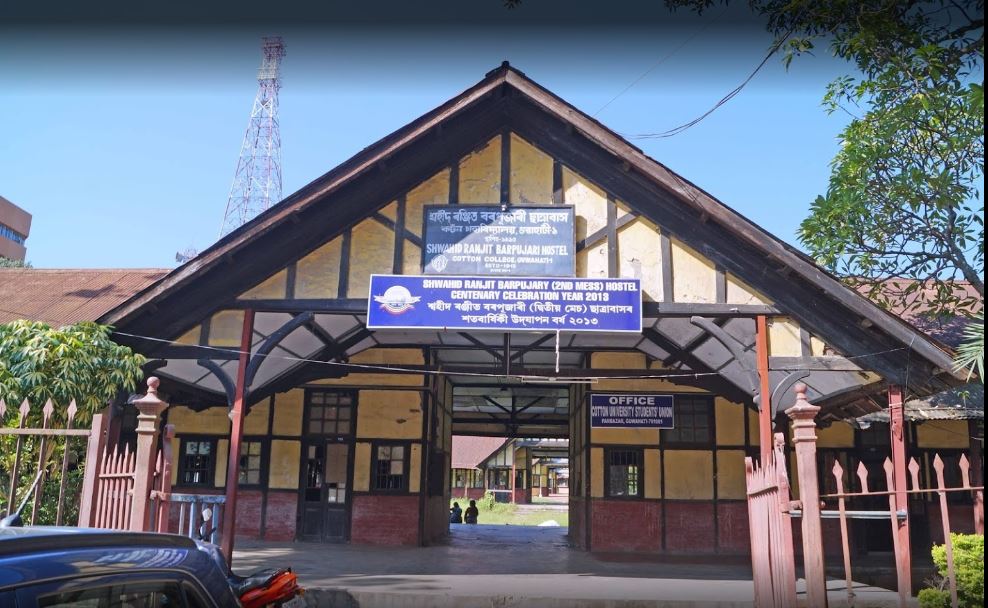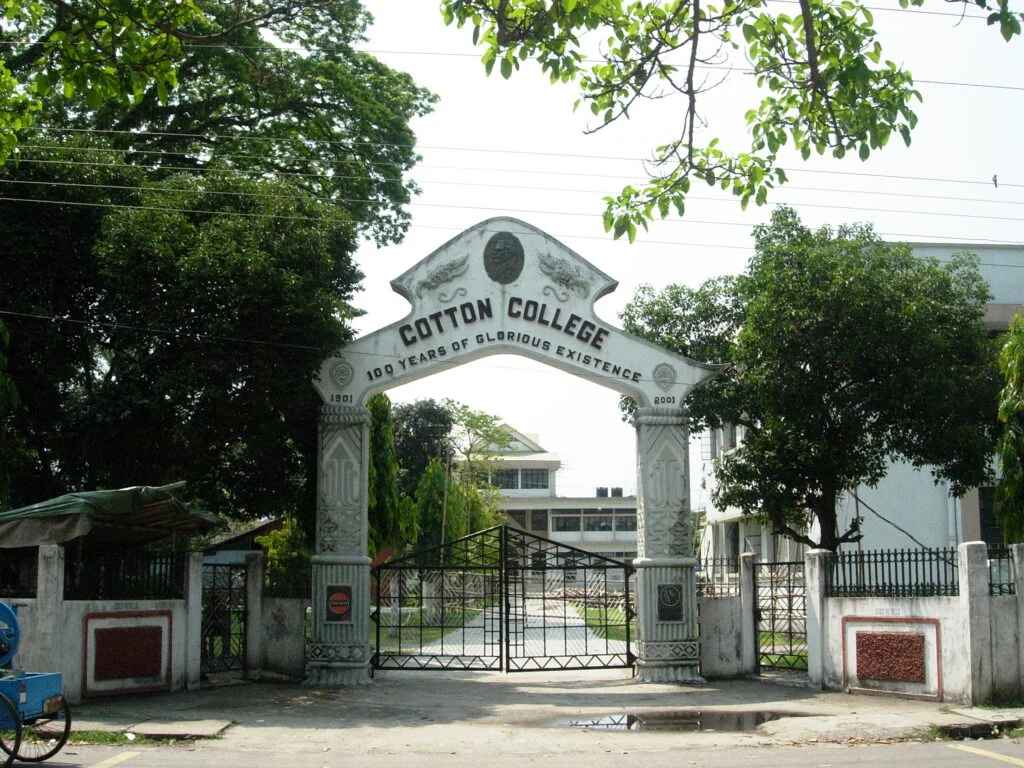Founded by Sir Henry Stedman Cotton, Cotton College was officially opened on May 27, 1901. As it celebrates over 100 years of academic excellence, Cotton College holds a prestigious position among higher learning institutions in Northeast India.
Named after Sir Henry Stedman Cotton to honor his commitment to higher education in the region, the college started with a small team of five professors, including its first principal, Frederick William Sudmerson, and 39 students. The inaugural admission on June 17, 1901, saw 37 students enrolled in the first-year F.A. class and two in the second year. Initially, classes were conducted in a building that now houses the Chemistry Department. It wasn’t until 1929 that the college admitted its first female students, marking the beginning of co-education.
Originally affiliated with Calcutta University, Cotton College developed into a full-fledged degree institution, securing honors courses in all subjects except Persian. With the establishment of Gauhati University in 1948, Cotton College became one of its original constituent colleges. Although postgraduate (PG) classes in subjects like English, Economics, and Botany were introduced earlier, they were discontinued due to economic reasons until PG classes in Physics were permanently reintroduced in 1969.
On October 16, 1992, the college was formally declared a postgraduate institution by Shankar Dayal Sharma, the then-President of India. Today, Cotton College offers both undergraduate and postgraduate education across 21 undergraduate and 20 postgraduate departments in science, humanities, and social sciences. The institution has grown significantly, now boasting an enrollment of over 5000 students and a faculty strength of 244.
Cotton College’s journey from a small undergraduate institution to a prominent seat of higher education reflects its unwavering dedication to academic excellence and its pivotal role in the educational landscape of Northeast India.
Historical Origins of Cotton College
- Founding by Sir Henry Stedman Cotton (1901):
- In 1901, Sir Henry Stedman Cotton, the Chief Commissioner of Assam, laid the foundation for Cotton College. His vision was to create an educational hub that would provide quality learning opportunities to the youth of Assam.
- The college began as a modest institution, but its impact would soon resonate far beyond its humble beginnings.
- Gauhati University Affiliation (1948):
- In 1948, Cotton College became a constituent college of Gauhati University.
- This affiliation solidified its position as a center for intellectual growth, fostering academic excellence across various disciplines.
Cotton College’s journey from its inception to its current status as Cotton University reflects resilience, dedication, and a commitment to nurturing young minds. Its legacy continues to inspire generations of students and educators alike.
Academic Excellence at Cotton College
- Diverse Disciplines:
- Cotton College provides a rich tapestry of undergraduate and postgraduate programs. Whether you’re drawn to literature, physics, or commerce, there’s a pathway for every student.
- From unraveling the nuances of poetry to decoding complex scientific theories, the college nurtures diverse interests.
- Eminent Faculty:
- The heartbeat of any educational institution lies in its faculty. At Cotton College, passionate educators, scholars, and researchers form the backbone.
- Their commitment to shaping young minds goes beyond textbooks. They inspire critical thinking, ignite curiosity, and foster a love for learning.
Cotton College’s academic ecosystem thrives on this synergy between disciplines and dedicated educators. It’s a place where knowledge blooms, and students embark on transformative journeys.
Cultural and Extracurricular Activities
- Cultural Festivals:
- Assamese Traditions: Cotton College comes alive during cultural festivals. Assamese traditions, rituals, and customs take center stage. From Bihu to Durga Puja, the campus reverberates with joy and color.
- Music and Dance: Students showcase their talents through mesmerizing music performances and graceful dance routines. The rhythms of the dhol and the elegance of traditional dances fill the air.
- Literary Pursuits: Literary festivals celebrate Assamese literature, poetry, and storytelling. Renowned authors and poets grace the events, inspiring young wordsmiths.
- Debates and Literary Clubs:
- Critical Thinking: Cotton College fosters intellectual curiosity. Debates, seminars, and literary clubs encourage students to think critically, analyze diverse perspectives, and articulate their thoughts.
- Thought-Provoking Discussions: Whether it’s dissecting a classic novel or debating contemporary issues, students engage in stimulating conversations. These forums nurture analytical skills and broaden horizons.
Notable Alumni
- Jyoti Prasad Agarwala:
- Multifaceted Talent: Jyoti Prasad Agarwala was a polymath—filmmaker, poet, musician, and playwright. His contributions to Assamese culture are immeasurable.
- Film Pioneer: Agarwala directed the first Assamese film, “Joymati” (1935), which remains a milestone in regional cinema. His storytelling prowess resonates even today.
- Literary Legacy: His poetry and songs evoke the essence of Assam—its rivers, folklore, and love for nature.
- Bhupen Hazarika:
- Voice of Assam: Bhupen Hazarika, the legendary singer, composer, and filmmaker, honed his talents at Cotton College.
- Iconic Music: His soul-stirring melodies, blending Assamese folk with contemporary themes, touched hearts across India. Songs like “Bistirno Parore” and “Ganga Behti Ho Kyun” are timeless.
- Social Activism: Hazarika’s music carried messages of unity, justice, and love. He championed social causes and celebrated Assamese identity.
These luminaries walked the hallowed halls of Cotton College, leaving behind a legacy that continues to inspire generations.
Transition to Cotton University
1. Act of 2017
- In 2017, the Assam government enacted legislation to elevate Cotton College to the status of a full-fledged university.
- This transformation involved merging Cotton College with Cotton College State University, streamlining administrative processes and enhancing academic offerings.
- The move underscored the institution’s unwavering commitment to academic excellence and broader educational impact.
2. National Rankings
- Cotton University has made significant strides in terms of national recognition.
- As per the National Institutional Ranking Framework (NIRF), it secured a place among the top 200 institutions in India.
- This achievement reflects the university’s dedication to maintaining high standards in teaching, research, and overall institutional performance.
Campus and Infrastructure

- Heritage Buildings:
- Cotton University’s campus features stunning colonial-era architecture.
- The blend of tradition and modern facilities creates a unique and inspiring environment for students and faculty.
- Library and Laboratories:
- The university houses state-of-the-art libraries, providing extensive resources for research and study.
- Well-equipped laboratories and research centers enhance the overall learning experience, fostering academic excellence.
Conclusion
Cotton College, now elevated to Cotton University, stands as a testament to Assam’s commitment to education. Its rich heritage, blend of tradition and modernity, and emphasis on academic excellence make it a beacon for students and scholars alike. As we bid adieu, let’s celebrate the institution’s journey—a legacy that continues to shape minds and futures.
FAQ’s
Q. What is Cotton College?
A: Cotton College is one of the premier higher education institutions located in Guwahati, Assam, India. It was established in 1901 and offers undergraduate and postgraduate courses in various disciplines.
Q. Where is Cotton College located?
A: Cotton College is located in the heart of Guwahati, the largest city in the state of Assam, India.
Q. When was Cotton College established?
A: Cotton College was established in 1901 by Sir Henry Stedman Cotton, the then Chief Commissioner of Assam.




